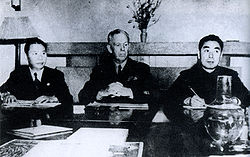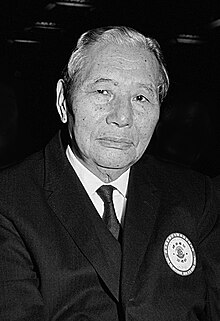Zhang Qun
| Zhang Qun | |||||||||
|---|---|---|---|---|---|---|---|---|---|
| Traditional Chinese | 張羣 | ||||||||
| Simplified Chinese | 张群 | ||||||||
| |||||||||
Zhang Qun[a] (May 9, 1889 – December 14, 1990) was a Chinese politician and premier of the Republic of China and a prominent member of the Kuomintang. He served as secretary general to the President of the Republic from 1954 to 1972 and senior advisor to Presidents Chiang Kai-shek, Yen Chia-kan, Chiang Ching-kuo, and Lee Teng-hui. Under the influence of his wife, Ma Yu-ying, he became a Christian in the 1930s.[2]
Education and early career
[edit]Born in the Huayang County (now part of Shuangliu County), Sichuan province, Chang was admitted in 1906 to the Baoding Military Academy, just southwest of Beijing. The next year, he was selected to go to Japan to study at the Tokyo Shimbu Gakko, a preparatory military school, where he specialized in artillery. Together with his classmate, Chiang Kai-shek, he joined the Tongmenghui the same year. After completing their preparatory studies, they both served in the Takada regiment of the Imperial Japanese Army’s 13th Field Artillery Brigade, stationed in Niigata Prefecture before returning to China to serve under Sun Yat-sen in the Xinhai Revolution which would overthrow the Qing monarchy in 1911. During this period, a lifelong friendship between the two men[who?] and Huang Fu was formed and the three became sworn, or blood, brothers. Chang married Ma Yu-ying (馬育英) in 1913; because their first child was born in 1917, he later joked to have practiced family planning long before it became popular.
When Yuan Shikai attempted to restore the monarchy, Chang fled to Japan, finished his military training at the Imperial Japanese Army Academy in 1915, and then went to the Netherlands East Indies, where he taught in an overseas Chinese school. Returning to China to participate in Yuan's overthrow in the National Protection War, he served as adjutant-general to Cen Chunxuan, president of the southern provinces, which repudiated Yuan's regime. With the restoration of the Republic, Chang held several posts. Becoming a major general of the National Revolutionary Army at age 28, he later became a member of the Kuomintang's Central Executive Committee, mayor of Shanghai and president of Tongji University, governor of Hubei province and foreign minister. In the KMT, he led the Political Science Clique (政學系), which included military men such as Huang Fu and Xiong Shihui (熊式輝), intellectuals, such as Yang Yongtai and Wang Chonghui, and bankers and industrialists, including Wu Dingchang (吳鼎昌) and Chang Kia-ngau. During World War II, he served as secretary general of the National Security Council and governor of Sichuan province.
Post-war career
[edit]In 1946, Chang, representing the national government, was a member of the Committee of Three (also known as the Marshall Mission) along with General George C. Marshall, then head of the U.S. Joint Chiefs of Staff, and Chinese Communist Party representative Zhou Enlai, which had been established in Nanjing in January 1946 to effect a Kuomintang-Communist truce and head off civil war. The Marshall Mission helped to bring about a temporary ceasefire, but its plans for a political-military settlement did not succeed.[2]
In 1947, Chang headed the first coalition government as president of the Executive Yuan, a position also known as premier of the Republic of China.[3]

His platform was to prepare China for constitutional government, land reform, and price control. Despite his long ties with Chiang Kai-shek, he could not bring about the political reforms that he favored.[2] After the transfer of the capital from Nanjing to Taipei, he became chief of staff and secretary general to the president in 1954. Among his duties were planning the government's foreign policy and representing the president in Japan, Africa and Europe, including the Second Vatican Council in 1965.

In 1972, he played a large role in the difficult negotiations regarding Japan's switch of diplomatic recognition to the People's Republic of China. His last official position was chairman of the Presidium of the Kuomintang's Central Advisory Committee.[2]

Personal life
[edit]A member of the board of the National Palace Museum, Chang was a renowned calligrapher, keen art collector, friend of great artists such as Chang Dai-chien, Huang Jun-bi and Ran In-ting, and recipient of honorary doctorates from several universities, including the University of Illinois, Seoul National University, St. John's University (New York), Sungkyunkwan University and Soochow University (Taiwan). He died at the age of 101 years, 219 days, of heart and kidney failure, at Veterans General Hospital in Taipei, on December 14, 1990.[4] From 20 January 1990, when former Japanese Prime Minister Prince Naruhiko Higashikuni died until his own death, Chang was the world's oldest living former head of government.
Chang's wife, Ma Yu-ying (馬育英; pinyin: Ma Yuying), was a devout Christian and died in 1974. His daughter, Yalan Chang Lew (劉張亞蘭; pinyin: Liu Zhang Yalan), died on July 14, 2014, at age 97 in Seattle, US; she was the widow of Ambassador Yu-tang Daniel Lew (劉毓棠; pinyin: Liu Yutang), who had died in 2005 at age 92 in Taipei. His son, Dr. Philip Chi-cheng Chang (張繼正; pinyin: Zhang Jizheng), who died on October 24, 2015, at age 96 in Taipei, was former communications minister 1969-72, chairman of the Council for Economic Planning and Development 1973-76, finance minister 1978-81 and governor of the Central Bank of China 1984-89. His second son, Rev. Dr. Theodore Chi-chong Chang, who died on October 26, 2020, at age 92 in California, was vice president of the Truth Theological Seminary and pastor emeritus of the Mandarin Baptist Church of Pasadena, California.[citation needed]

Awards
[edit] Order of National Glory
Order of National Glory Order of Blue Sky and White Sun
Order of Blue Sky and White Sun Order of Chiang Chung-Cheng
Order of Chiang Chung-Cheng Order of the Brilliant Star, Special Class with Grand Cordon
Order of the Brilliant Star, Special Class with Grand Cordon Order of the Three Stars, 1st Class (January 19, 1937)[5]
Order of the Three Stars, 1st Class (January 19, 1937)[5]
Notes
[edit]- ^ Chinese: 張羣; pinyin: Zhāng Qún; Wade–Giles: Chang Ch'ün;[1] also known as Zhang Yuejun (張岳軍)
References
[edit]- ^ "Profile of Zhang Qun". Archived from the original on 2023-04-07. Retrieved 2023-03-28.
- ^ a b c d Biographical Dictionary of Republican China Archived 2023-04-06 at the Wayback Machine, Volume 1: Ai-Ch'u. Howard L. Boorman, Editor; Richard C. Howard, Associate Editor. New York: Columbia University Press, 1966, pp. 47-52
- ^ China: Hao Hao, Time Magazine on Chang's appointment as premier, April 28, 1947
- ^ Chang Chun Is Dead; Taiwan Aide Was 101, The New York Times, December 16, 1990
- ^ "Ar Triju zvaigžņu ordeni apbalvoto 22. saraksts" [Recipients of the Order of the Three Stars, No. 22]. Valdības Vēstnesis (in Latvian). No. 107. 1937-05-14. p. 1. Archived from the original on 2021-06-29. Retrieved 2022-01-02.
External links
[edit]- Article on the Chang residence in Shanghai by Michelle Qiao, Shanghai Daily Home
- Photo of Premier Chang arriving at the National Assembly's first meeting in 1948
- Chang Chun examining Yangtze River, the 65-foot-long painting by Zhang Daqian, commissioned for his 80th birthday
- Photographic article on the Chang Residence in Shihlin, designed by Wang Da-hong. On April 7, 2014, the residence was declared a cultural heritage site by the Taipei City Department of Cultural Affairs.
- August 4, 2017 TVBS review of future use of the Chang Residence in Shihlin
- Inclusion of the Chang Residence in Soochow University's History Map
Internet videos
[edit]- Governor Chang takes salute at a parade of Central Military Academy cadets, marking the 31st anniversary of the Chinese Revolution in 1942
- General George Marshall attends signing of Chinese Truce. National Security Council Secretary General Chang Chun and Communist representative Zhou Enlai sign the truce in 1946. (From National Archives and Records Administration - ARC 39099, LI 208-UN-192, beginning at 6:56)
- 行政院長張群蒞台 Premier Chang arrives in Taipei in October, 1947
- 台灣省慶祝第二屆光復節大會 Premier Chang presides over the celebrations of Taiwan's Retrocession Day, October 25, 1947
- 張群特使訪日專輯 Special Envoy Chang Chun visits Japan, where he met with the Emperor, Prime Minister Nobusuke Kishi and others in 1957
- 日本前首相吉田茂訪華 Secretary General Chang receives former Japanese Prime Minister Shigeru Yoshida in 1964
- 長江萬里圖 The 65-foot-long painting, Yangtze River by Chang Dai-chien, commissioned for Chang Chun's 80th birthday, on display at the National Museum of History in Taipei in 1967
- 行政院新舊任院長交接典禮 Secretary General Chang presides over the transfer of the premiership in 1972
- 張學良 Chang Hsueh-liang's 90th birthday celebration, hosted by 101-year-old Chang Chun on June 1, 1990 (View especially from 0:29-1:04 where Chang Chun remembers their friendship of 60 years)
- 1889 births
- 1990 deaths
- Chinese men centenarians
- Tongmenghui members
- People of the 1911 Revolution
- Mayors of Shanghai
- Baoding Military Academy cadets
- Chinese police officers
- Senior advisors to President Chiang Kai-shek
- Senior advisors to President Chiang Ching-kuo
- Senior advisors to President Lee Teng-hui
- Premiers of the Republic of China
- Vice premiers of the Republic of China
- Foreign ministers of the Republic of China
- Politicians from Chengdu
- Republic of China politicians from Sichuan
- Kuomintang politicians in Taiwan
- Recipients of the Order of Brilliant Star
- Recipients of the Order of Chiang Chung-Cheng
- Sichuanese Protestants
- Taiwanese Protestants
- Taiwanese people from Sichuan


